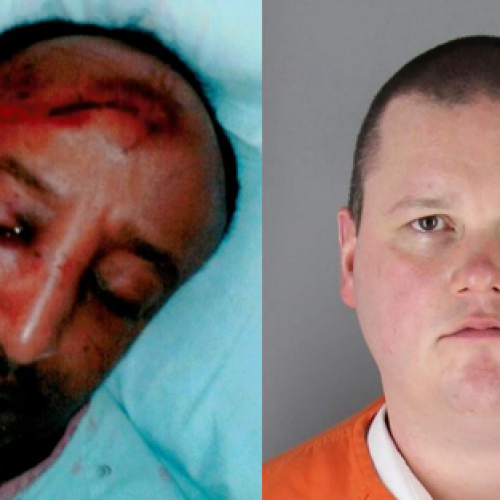When I was around 10 years old, my father confronted a young man who was said to be “crazy.” The young man was always too quick to want to fight. A foul in a game of 21 was an insult to his honor. A cross word was cause for a duel, and you never knew what that cross word might be. One day, the young man got into it with one of my older brother’s friends. The young man pulled a metal stake out of the ground (there was some work being done nearby) and began swinging it wildly in a threatening manner. My father, my mother, or my older brother—I don’t recall which—told the other boy to go inside of our house. My dad then came outside. I don’t really remember what my father said to the young man. Perhaps he said something like “Go home,” or maybe something like, “Son, it’s over.” I don’t really recall. But what I do recall is that my dad did not shoot and kill the young man.
That wasn’t the first time I’d seen my father confront the violence of young people without resorting to killing them. This was not remarkable. When you live in communities like ours—or perhaps any community—mediating violence between young people is part of being an adult. Sometimes the young people are involved in scary behavior—like threatening people with metal objects. And yet the notion that it is permissible, wise, moral, or advisable to kill such a person as a method of de-escalation, to kill because one was afraid, did not really exist among parents in my community.
The same could not be said for those who came from outside of the community.
This weekend, after a Chicago police officer killed her 19-year-old son Quintonio LeGrier, Janet Cooksey struggled to understand the mentality of the people she pays to keep her community safe:
“What happened to Tasers? Seven times my son was shot,” Cooksey said.
“The police are supposed to serve and protect us and yet they take the lives,” Cooksey said.
“Where do we get our help?” she asked.
LeGrier had struggled with mental illness. When LeGrier attempted to break down his father’s door, his father called the police, who apparently arrived to find the 19-year-old wielding a bat. Interpreting this as a lethal threat, one of the officers shot and killed LeGrier and somehow managed to shoot and kill one of his neighbors, Bettie Jones. Cooksey did not merely have a problem with how the police acted, but with the fact that the police were even called in the first place. “He should have called me,” Cooksey said of LeGrier’s father.
Instead, the father called the Chicago Police Department. Likely he called them because he invested them with some measure of legitimacy. This is understandable. In America, police officers are agents of the state and thus bound by the social contract in a way that criminals, and even random citizens, are not. Criminals and random citizens are not paid to protect other citizens. Police officers are. By that logic, one might surmise that the police would be better able to mediate conflicts than community members. In Chicago, this appears, very often, not to be the case.
It will not do to note that 99 percent of the time the police mediate conflicts without killing people anymore than it will do for a restaurant to note that 99 percent of the time rats don’t run through the dining room. Nor will it do to point out that most black citizens are killed by other black citizens, not police officers, anymore than it will do to point out that most American citizens are killed by other American citizens, not terrorists. If officers cannot be expected to act any better than ordinary citizens, why call them in the first place? Why invest them with any more power?
For full story visit: https://www.theatlantic.com/politics/archive/2015/12/illegitimacy-and-american-policing/422094/?utm_source=SFFB
If you haven’t already, be sure to like our Filming Cops Page on Facebook and follow us on Twitter.
Please visit our sister site Smokers ONLY
<!–
(function(d) {
var params =
{
id: “3c7936d6-71e2-4cba-afb4-95ed4171941f”,
d: “ZmlsbWluZ2NvcHMuY29t”,
wid: “365543”,
cb: (new Date()).getTime()
};
var qs=[];
for(var key in params) qs.push(key+’=’+encodeURIComponent(params[key]));
var s = d.createElement(‘script’);s.type=’text/javascript’;s.async=true;
var p = ‘https:’ == document.location.protocol ? ‘https’ : ‘http’;
s.src = p + “://api.content-ad.net/Scripts/widget2.aspx?” + qs.join(‘&’);
d.getElementById(“contentad365543”).appendChild(s);
})(document);
–>
Source Article from http://filmingcops.com/paranoid-style-american-policing/
Related posts:
Views: 0
 RSS Feed
RSS Feed















 January 3rd, 2018
January 3rd, 2018  Awake Goy
Awake Goy 

![[WATCH] Palm Beach Sheriff Settles for $500,000 for Down Syndrome Teen They Shot Down](https://www.jewworldorder.org/wp-content/uploads/2018/01/Jeremy-Hutton-500x500_c.jpg)
![[WATCH] Ramsey Orta Beaten by Prison Guards in Retaliation For Filming Eric Garner Death](https://www.jewworldorder.org/wp-content/uploads/2018/01/Orta-1-500x500_c.jpg)

 Posted in
Posted in  Tags:
Tags: 
















